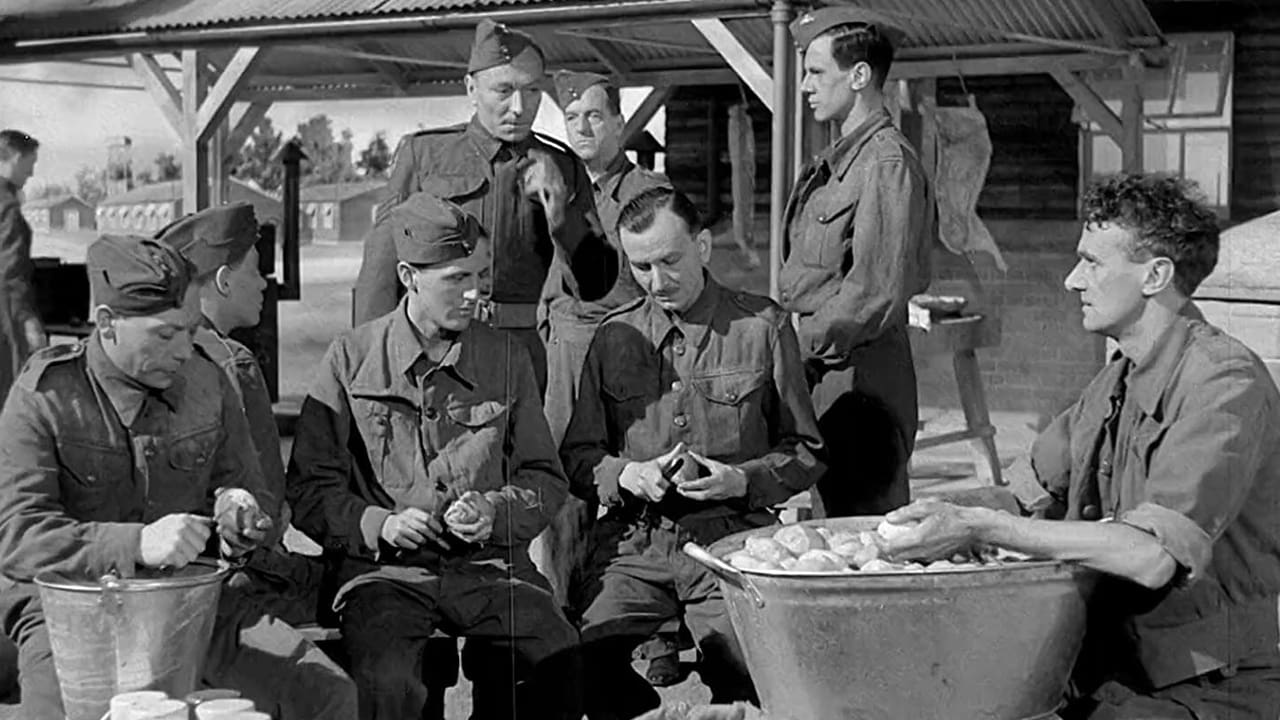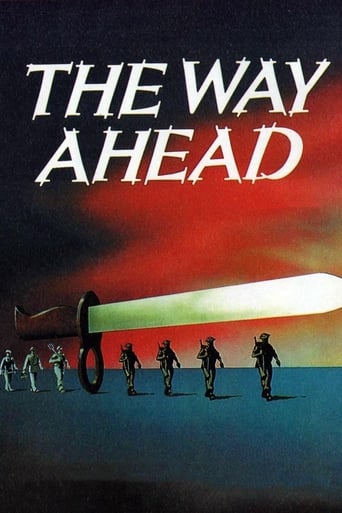

Wonderful character development!
... View MoreSERIOUSLY. This is what the crap Hollywood still puts out?
... View MoreGreat Film overall
... View MoreIt was OK. I don't see why everyone loves it so much. It wasn't very smart or deep or well-directed.
... View MoreTHE WAY AHEAD is a British WW2 propaganda movie extolling the virtues of the British army and perhaps helping inspire people to sign up. Watching it today, it's a great film purely because it contains an ensemble cast of familiar faces, all of whom give fine performances. Like FULL METAL JACKET, most of the film is about training, training, and more training, with the real battle stuff saved for the final moments, but that doesn't mean that it's a dull movie. It's anything but.David Niven headlines the film as the officer in charge of a rag-tag group of men. Conflict arises from the stern disciple he extols, but of course it all comes right in the end. What's special here is the effort made to characterise all of the individual soldiers, and the writer does his job very well in this respect. Carol Reed's direction is exemplary too. The cast includes Hugh Burden, William Hartnell, Stanley Holloway, James Donald, John Laurie, Leslie Dwyer, Jimmy Hanley, Raymond Huntley, Peter Ustinov and Leo Genn, and it's fair to say that not one of them puts a foot wrong.
... View MoreIt's long but it's good. For a British film from 1944 the production values are amazingly high. Whole buildings -- real ones -- collapse. The special effects at sea are convincing. And what a cast! Actually, the story itself is hardly new. A diverse group of men are drafted into the Duke of Glendons, go through a training camp periods, their transport is torpedoed, and they fight a small-scale defensive battle among the ruins of a village in North Africa. Writers Eric Ambler and Peter Ustinov have whipped it into entertaining shape.None of the men is regular army except the tough sergeant who has eyes like a lizard but the heart of a Rogerian therapist. David Niven has risen from the ranks and is a lieutenant. The men themselves, with their winsome misapprehensions, are brought into a state of readiness by a combination of strict physical demands and compassion. The leaders are stern but fair. I won't bother describing the draftees because you can already guess their nature from a dozen other war movies -- the grumbler, the show-off, the snob, the Welshman, the earnest patriot.If you didn't know that it was directed by Carol Reed, you'd still probably notice some unusual directorial touches. A sleepy backwater little town. An old man, half asleep, brushing the flies from his face. A dog sleeping in the street. And then the distant sound of motorcycles and bren carriers growing louder. And soon a stream of British vehicles lumbering loudly through the main street and stirring the dust, with the dog lazily moping away and a disheveled Peter Ustinov emerging from the Cafe Rispoli to stare sullenly at the pageant.It may or may not sound promising in a synopsis but in fact it's pretty good.
... View MoreThe Way Ahead is a really enjoyable and really well disciplined war film covering an array of folk, each with their own separate walks of life, going on to serve not only one another but their country in the process of coming to learn of particular traits to do with responsibility and respect to one's seniors within a field. The nucleus of this 1944 British film is in the depiction of several different people of varying jobs and classes coming together and putting aside differing traits, with one another and their official superiors, to win through but its rawer achievement is when that content is essentially dealt with without necessarily affecting the film's overall quality as such. A lesser film would almost certainly have dropped its guard and settled for routinely seeing things out to a conclusion of some kind, a conclusion of which may not have been as interesting nor as necessary as what had preceded it. It is, therefore, much to the director Carol Reed's credit that they are able to mould what is a fascinating character study, consisting of the many but whose ventures are streamlined into being felt as one, before maintaining those levels of excitement and interest when a distinct shift in both tempo and content arrives and the film finally comes to shipping them out to the front-lines of World War Two. On both of those fronts; as a fascinating slice of wartime filmmaking and as a straight up piece of drama, The Way Ahead is a rigorous success.The film begins with a slow sweep across a row of veterans from the First World War, disciplined; standing to attention; and wholly focused as they stand in their uniforms with medals on show, they represent a past generation of men encapsulated by bravery and duty whom aided in the maintaining of British life at time of great strife: a sense of the establishment of what "has been" and what "must follow" prominent. Reed blurs the boundaries between reality and non-reality by having one of the troops sneak a glance at the camera as it tracks past, a blurring which works with the film throughout as the following sequence adopts somewhat of a newsreel aesthetic in its presenting of British soldiers going through various training exercises.These veterans share a tie to a specific Army squadron of varying distinctions throughout history, the new recruits this squadron takes on of whom, in the eyes of the veterans, are not up to standard and unable to carry on the former glories of the platoon. The film is, therefore, one of which that adopts a necessary framework of allowing its leads to prove their ability; the covering of a disparate collection of men from all walks of life going from one extreme to the other, from a working man with little knowledge, or even respect, of the Army and its routines to an all out as-one functioning fighting machine capable of doing what needs to be done in the heightened scenario of a war-zone.In the beginnings, things are tough in amidst the throngs of war; a war people always thought would come but always hoped it wouldn't. Day-set bombing raids and rationing become the norm, and the rattling around of a local public house as well as those within whom attempt to get some sort of grip on the situation as bombs fall around them neatly amplifies the literal clinging onto the situation Britain finds itself in. At an Army camp a train journey away, some London based locals have been called for basic training and have arrived off of a truck in an unordered and scattered fashion at the barracks; something capturing their current placing in regards to working with one another. They are soon regimented and bullied into a form of conformity, William Hartnell's drill Sergeant Fletcher acting as a more immediate superior to that of local C.O. Jim Perry, played by David Niven, whom, bemusingly, has his presence pasted all over the film's posters despite having very little to do with what it is the film is actually about. The film is rather comedic during these exchanges of the opening third, misleadingly so; the new troops bouncing off of one another in a humorous manner as they come to despise Fletcher and struggle on through together - trips to a local stately home run by an elderly woman peppering proceedings and seeing her speak to them as if children, as if presently devoid of the masculinity the film will eventually come to instill them with at this time. Despite being produced in 1944, a full year and maybe more before the conclusion of The Second World War, the film does not lean too heavily towards its propagandist undercurrents even if there is an unshakable sense that such undercurrents exist. Certainly, as The War raged on and all the strife that came with it further unravelled, how nice and assuring it would have been to attend a picture house documenting a bunch of rag-tag guys, the likes of whom may even live locally or next door, transcending from such a labelling to people capable of dealing with even the most harrowing of enemy instigated bother on the front-line in an ordered and professional manner. The film's pseudo-documentary characteristics are abound in the continuous updating of the viewer of European situations as the war factually mutated around the film's production, something which runs in sync with the breaking of the fourth wall in the very first scene and apparent 'live' opinions of various folk occupying Britain speaking without advancing anything on what it is should unfold to aid the war effort abroad. The film is wholly dramatic, but on very small scales early on as it depicts the forging of a fighting force, before opening up into war-zone set skirmishes that carry with them significant amounts of peril; the likes of which combine into a highly accomplished piece.
... View MoreThis is a film about a seemingly run of the mill sort of group. After the Brits were involved in WWII and saw how bad the going would be, the government was forced to draft men who would traditionally have been exempt. Men who were a bit old or involved with careers that might be deemed 'useful' to the effort were suddenly being called to duty, as times were dire. The beginning of the film shows these men being selected for service.Unfortunately, this is a rather motley group and they tended to complain quite a bit as well (mostly by Stanley Holloway's character). How they could become a productive unit seemed pretty doubtful and I doubt if such an unimpressive group of men would have been used as actors had this propaganda film been made a few years earlier--when things looked really bad for the British. However, now that the war was appearing win-able, I can understand the choices of actors.There is nothing particularly magical about any of the film--their selection, their training or their combat experience in North Africa. However, all of it was very well handled and excelled because they tried to make it believable--normal, everyday men rising to the occasion. In many ways, it reminded me of a landlocked version of "In Which We Serve"--with fine acting and writing instead of jingoism and super-human exploits. Very well done.There are a few interesting actors in the film. Peter Ustinov is in his first film and he plays a French-speaking man. While his French isn't 100% fluid, it was decent and a bit of a surprise. Apparently, he was in real life David Niven's assistant in the British Army and somehow ended up in the film--and thus began his career. Also, Dr. Who fans will appreciate that the Sergeant is played by Dr. #1, William Hartnell.By the way, this is a little explanation for those who are not British or familiar with British history. Early in the film, someone asks Stanley Holloway's character who he liked in Parliament. Holloway indicates the only one he liked was Guy Fawkes! Fawkes was part of a plot to blow up Parliament in 1605, but was caught and executed--and the Brits celebrate this to this day with Guy Fawkes Day--as day of merry-making, bonfires and fireworks! Obviously Holloway's character wasn't exactly fond of the government, eh?!
... View More